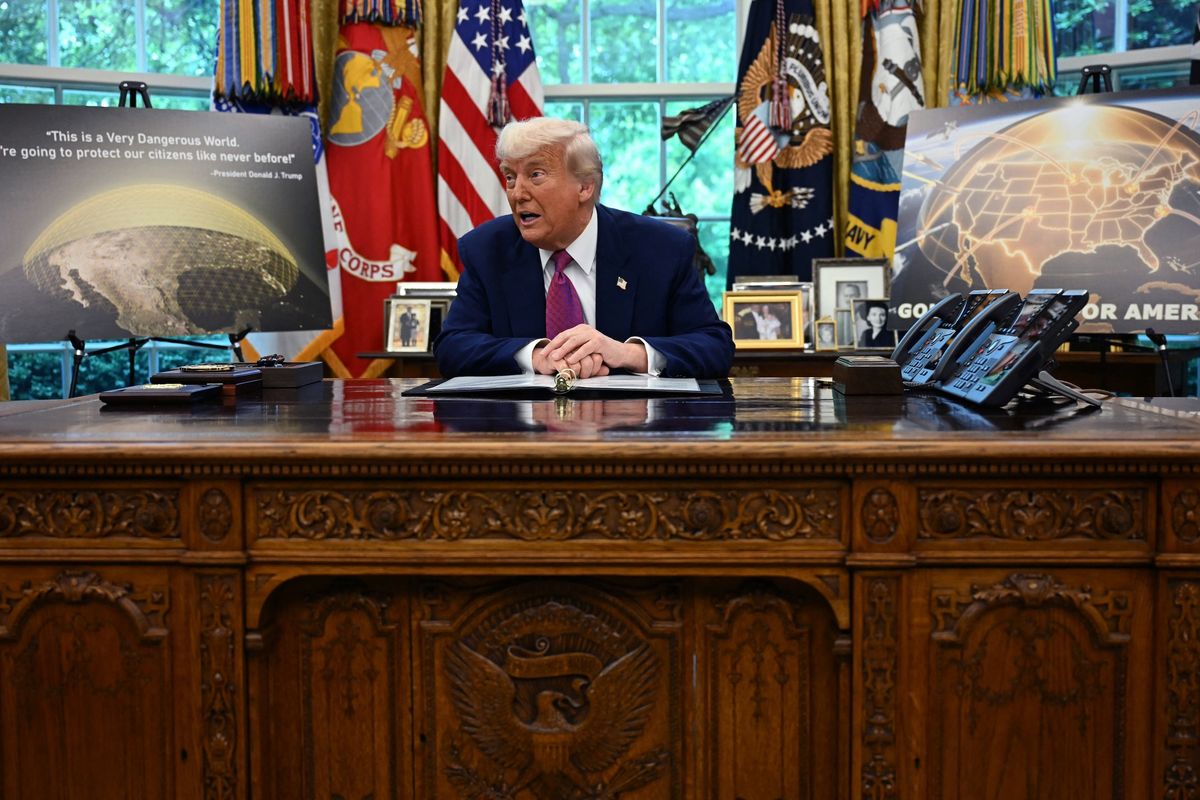President Donald Trump’s recent announcement to the National Space Council that he is asking the Pentagon to create a new ‘Space Force’ caught many off guard. In particular, many at the Pentagon who will be tasked with plotting the way ahead.
In the hours after the President made his comments, Air Force Secretary Heather Wilson and Air Force Chief of Staff Gen. David Goldfein, both of whom have been cautious of the idea in the past, sent a message to airmen saying that the new force would be created, but they also gave hints about what mountains need to be moved in order to make that happen. ‘The work directed by the President will be a thorough, deliberate and inclusive process,” according to Wilson and Goldfein.
As Wall Street marvels at the idea of boosting an already estimated $350 billion space economy, those who have taken on previous integrative tasks within the Air Force and broader DoD weighed in to tell us how this will likely come together.
‘It’s a mission that will take years’, says Former Air Force Secretary Deborah Lee James, who perhaps is exercising a little more permission to speak freely than her successor can do, as she points out the shortcomings of the announcement.
The Cipher Brief’s Brad Christian spoke with Deborah Lee James about what is most likely to happen next.
Christian: As the former Air Force Secretary, what was your first reaction when you heard the President say we’re going to create this new space entity?
Lee James: My first reaction: I wondered what the President had maybe just seen on TV that spurred him to do this. The announcement was a surprise to the Pentagon. Secretary James Mattis did not know it was coming. The Air Force did not know it was coming. As a matter of fact, the President was speaking from prepared remarks for the Space Council that the inter-Agency had looked at. Those remarks did not contain an announcement about Space Force. So this was another adlib that took everybody by surprise and clearly was not well thought through.
As you probably know, there are one or two studies that Secretary Mattis is charged with conducting. They’re in process, but those studies were directed by Congress, so they have to be done. The first one is due in the August timeframe, the second one is due at the end of the year. The Center for Naval Analysis was hired to do one of those studies which is meant to examine whether a Space Corps is a good idea and if not, why not? If so, why? This would be the beginning of how you might map it out. This was by order of the National Defense Authorization Act of the House and Chairman Rogers (who was the proponent of space corps).
The second study was ordered to provide more specifics on how you would pave the way and actually do it. So now that the president has decreed it will happen, it will be interesting to see what this first report says because it’s no secret that Secretary Mattis and the Air Force have been against the idea – so now if they want to protect their jobs – they’re going to have to reverse or appear to reverse, their position in order to back up what the president said.
If I had to guess, the Center for Naval Analysis will likely provide options and those options will likely have pros and cons. So I would think that they’re key job will be to bring forth data and to elevate risks and to talk about pros and cons and benefits and detractors. So they are the data people in the process of how this will go.
Christian: The risk that we’re moving from what has traditionally been an integrated, studied, process to a more disjointed approach to space, is that a risk in and of itself?
Lee James: I think that’s a major risk. I think another risk would come from the fact that this will - by far – be the smallest service in the military if it happens. It would be smaller than the Coast Guard. Is that really going to have enough heft to make it viable for the long term so that a Space Force can stand its ground against much larger entities in the budget, policy, political arena? I think that’s a risk. I also think the risk of bureaucratic thrashing is enormous. The idea that these sorts of changes can be done and be done easily is usually espoused by people who have never done them and who have never had the experience. When you make a major change to bureaucracy – and certainly there have been times in history where we have – and it sometimes works out well, but it usually takes years. I mean just look at the debates that have gone on in the Pentagon about dividing up the undersecretary of acquisition, just that small thing and they’re still thrashing.
Christian: Those who are in support of the creation of a new force argue that the U.S. has fallen behind in space and needs to advance innovation in order to speed up progress, but you don’t think that is likely to happen by following a quicker path to creating the new force?
Lee James: That’s right. For politicians and people who have never done this before, when they spot a problem – one of the easiest things to do is to direct some sort of a reorganization. Why is that easy? Because it’s easy to write into law. What’s not so easy, and why I say it’s hard for those who have never been in it, to understand, is the implementation of it. That’s where the thrashing comes in and the law of unintended consequences will bite you. This is where there is a ton of detail, and work, and it takes a lot of digging into. There isn’t much of an appreciation for that by the ones with the ideas, so I say, if the problem is enormous, and if a re-org will fix it, then go for it. As long as you know what you’re getting into. And as long as you’re pretty sure that it will solve your problem.
I say if money is the problem, if space isn’t getting enough money, the Space Force isn’t the solution. It’s not going to give you money. In fact, it’s going to take away money from the space mission because you are going to have to create a certain amount of infrastructure, new people, and a certain amount of bureaucracy. Certainly bureaucracy can be enormous, or it can be more streamlined, but you’re kidding yourself if you think there is not going to be some kind of structure that’s going to be created around it. So, if money is your problem, Space Force is not the solution. You will face acquisition slowness, a lack of creative problem solving and an inability to get things done fast enough. That’s a problem across the board, actually, not just in space.
And if acquisition speed is your problem, Space Force is also not your solution, because you are going to separate out the same people, and processes that are doing it now for the Air Force, put them into a new entity, and expect a different result. There are other ways, and in fact, the Air Force, under my tenure and continuing with my successor Heather Wilson, is making a number of changes for acquisition. The OSD (Office of the Secretary of Defense) is getting out of the way for Air Force Space and other programs across the board, which is good because that was another layer of review, that took time. So there are a variety of things going on, to speed up acquisition, but creating a Space Force isn’t going to do it.
The final point I will make is that you can reorganize the entire DOD a thousand different ways. How about we create a separate Submarine Force? Because how can the Navy concentrate on ships, aircraft and submarines? How about a Nuclear force that is separate, given the relative priority of nuclear in our country? We can take the Air Force nuclear, and the Navy nuclear away and create our own service. You can go on and on with this. So I come back to the point on Space Force, is the juice worth the squeeze? For the amount of money we will throw at this, is it really worth it? Is it going to solve your problems? I say no.
Christian: One of the themes we repeatedly hear is how important U.S. dominance is in all of the domains, including cyber and space, and how critical it will be for the U.S. moving forward to maintain dominance. In your opinion, is creating a Space Force going to help or hurt the U.S. pursuit of dominance in Space?
Lee James: I don’t think it will help. On the part of Chairman Rogers, this is well intended, but I don’t think the President has thought it through. He’s famously not into details, and I think he’s looking for big, bodacious things that make a splash. I think Congressman Rogers is very thoughtful, and is thinking hard about these very challenging problems, but I don’t think this is the best solution, but it is the easiest solution for somebody in the legislative branch to take, because they are not the implementers. It’s much easier to write this stuff into law. I see where he is coming from, and appreciate his effort, but disagree with the solution here. The warfighting aspect comes from the Combatant Commanders, it doesn’t come from the Service Secretaries. So here is where U.S. Strategic Command comes in. Stratcom is responsible for space and nuclear. You’ve got Cybercom, how many years have we been talking about that? They’ve been thrashing about with that for three years, and we’re about to have a Cybercom, and it will take longer for it to be fully up and running, but it’s going to happen. So, one idea is to have a SpaceCom because that’s the warfighting aspect. So if you think it’s too much for nuclear and space to be put together, then separate space out and you can have another combatant command. I’m reminded of the 1980’s hostage rescue debacle, when we attempted to get our hostages out of Iran. And that is one of the points of origin of the idea of a Special Operations Command. They didn’t create a new service, they created a new command, because that’s the warfighting component.
Christian: So you’re saying there is clear precedence within DOD for success in terms of SOCOM and CYBERCOM. So, one solution you would recommend and support, is the creation of a SpaceCom?
Lee James: Yes, I would support that more than the idea of a separate military service. Obviously Congress gets a vote, and there are some people who are in favor of this, but there are others who are not, so there will have to be separate hearings on this and there will be lots more to follow.













